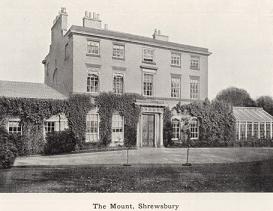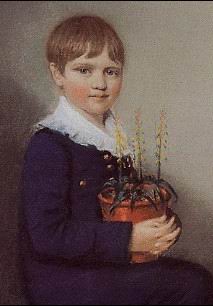
Born on 12th February 1809 into a wealthy family, Charles Robert Darwin had a pretty ordinary childhood. He didn’t enjoy or do well at school but he had, from an early age, a passion for nature – both collecting it and shooting it.
Darwin’s Origins
Charles Darwin was born on the 12th February 1809 at The Mount, the estate home on the edge of Shrewsbury of his very wealthy father, the famed doctor Robert Darwin. He was the fifth of six children – Marianne, Caroline, Susan, Erasmus, Charles and Catherine and was adored by his older sisters, especially after the death of his mother when he was eight.

The Darwin household was part of an extended family with the Wedgwoods, his mother’s family who lived nearby at Maer, and young Charles grew up in a very protected and happy environment. His father encouraged his son’s interest in his own hobby, botany, but also made sure that he had a traditional education in Latin and Greek at the boarding school attended by his brother.
Too Cool For School
Darwin hated his time at school, in his Autobiography he wrote:
‘Nothing could have been worse for the development of my mind… the school as a means of education to me was simply a blank’
So naturally Charles did the minimum work possible, preferring to spend his time bird-watching and collecting beetles. Darwin was born a naturalist. Large chunks of his youth were spent rummaging through his father’s gardens and land looking for interesting critters. Darwin himself reflected on his early habits in his Autobiography, he wrote that the ‘passion for collecting, which leads a man to be a systematic naturalist, a virtuoso or a miser, was very strong in me, and was clearly innate’.

Charles had a go with experimental chemistry too. He and his elder brother Erasmus had their own chemistry laboratory built for them in their garden shed. Here the two brothers conducted numerous chemical and mineralogical experiments, working from popular ‘recipe’ books. These experiments must have been quite pungent, as his activities in his shed earned him the nickname ‘Gas’ at school.
Shooting To Success
s a teenager he became obsessed with shooting and would often go out to shoot with his Uncle Jos (Josiah Wedgwood) and William Owen, the head of the other household that the family were close to. His father was worried that the boy would become one of the idle rich, prompting him to tell Charles that ‘you care for nothing but shooting, dogs and rat-catching; and you will be a disgrace to yourself and all your family’. Shooting birds was then a very acceptable sport which the young Darwin clearly enjoyed and was very good at. But his passion for shooting eventually faded, one story states that he once came across a bird that was shot the day before but was still alive; another tells of a beetle that was sent to him as an old man, alive but clearly suffering, Darwin gently put both of these creatures out of their suffering. It is also clear that Darwin’s zeal for shooting on the Beagle Voyage started to diminish, and he often hired men to do the shooting for him.
His passion for collecting never stalled. As a university student at Christ’s College, Cambridge Darwin was an avid beetle collector, eventually amassing one of the best beetle collections he knew of. His beetle collecting also got his name in print for the first time, J. F. Stephen lists Darwin as a collector in his Illustrations of British Entomology. Throughout his life Darwin continued to collect; on the Beagle voyage it was his main occupation, he later (by post) collected enough barnacles to write the authoritative account of the group, his next project saw him collect the bones and measurements of many domestic animals, and of course the greatest hallmark of Darwin’s work was his collecting of facts which he used so well to outline and support his theories!
Better To Have Loved And Lost
Like most young men Darwin had eyes for more than just beetles and birds. When he was 18 the young Charles set his eye on a different sort of bird, Fanny Owen, the daughter of a family friend. She was dark eyed, petite and apparently quite striking, and a bit of a flirt. Darwin, the young romantic, took her shooting and for walks in the Owen country estate and they exchanged flirtaceous letters referring to one another as Mr. Postillion and the dutiful housemaid; Darwin even had thoughts of marriage!
When he went off to university there was a possibility she might have waited for him, but when he decided to go on a round the world trip she did not. Whilst on the other side of the world Darwin got letters saying Fanny had married another, he was devastated! Especially when she continued to send flirty letters…
Written by Sarah Gardner
References & Further Reading
The Autobiography of Charles Darwin
by Charles Darwin (Edited by Francis Darwin), The Thinker's Library : 1929
Charles Darwin
by Cyril Aydon, Robinson : 2003
Darwin
by John van Wyhe, Andre Deutsch : 2009
Darwin
by Adrian Desmond & James Moore, Penguin : 1991
The Life of Charles Darwin
by Francis Darwin, Senate : 1995 (1902)